Research
| Part of a series on |
| Research |
|---|
 |
| Philosophy portal |
| Communication |
|---|
 |
| General aspects |
| Fields |
| Disciplines |
| Categories |
Research is "creative and systematic work undertaken to increase the stock of knowledge".[1] It involves the collection, organization, and analysis of evidence to increase understanding of a topic, characterized by a particular attentiveness to controlling sources of bias and error. These activities are characterized by accounting and controlling for biases. A research project may be an expansion of past work in the field. To test the validity of instruments, procedures, or experiments, research may replicate elements of prior projects or the project as a whole.
The primary purposes of
A researcher is a person engaged in conducting research, possibly recognized as an
Etymology

The word research is derived from the Middle French "recherche", which means "to go about seeking", the term itself being derived from the Old French term "recerchier," a compound word from "re-" + "cerchier", or "sercher", meaning 'search'.[4] The earliest recorded use of the term was in 1577.[4]
Definitions
Research has been defined in a number of different ways, and while there are similarities, there does not appear to be a single, all-encompassing definition that is embraced by all who engage in it.
Research, in its simplest terms, is searching for knowledge and searching for truth. In a formal sense, it is a systematic study of a problem attacked by a deliberately chosen strategy, which starts with choosing an approach to preparing a blueprint (design) and acting upon it in terms of designing research hypotheses, choosing methods and techniques, selecting or developing data collection tools, processing the data, interpretation, and ending with presenting solution(s) of the problem.[5]
Another definition of research is given by John W. Creswell, who states that "research is a process of steps used to collect and analyze information to increase our understanding of a topic or issue". It consists of three steps: pose a question, collect data to answer the question, and present an answer to the question.[6]
The Merriam-Webster Online Dictionary defines research more generally to also include studying already existing knowledge: "studious inquiry or examination; especially: investigation or experimentation aimed at the discovery and interpretation of facts, revision of accepted theories or laws in the light of new facts, or practical application of such new or revised theories or laws"[4]
Forms of research
Original research
Original research, also called primary research, is research that is not exclusively based on a summary, review, or synthesis of earlier publications on the subject of research. This material is of a primary-source character. The purpose of the original research is to produce new knowledge rather than present the existing knowledge in a new form (e.g., summarized or classified).[7][8] Original research can take various forms, depending on the discipline it pertains to. In experimental work, it typically involves direct or indirect observation of the researched subject(s), e.g., in the laboratory or in the field, documents the methodology, results, and conclusions of an experiment or set of experiments, or offers a novel interpretation of previous results. In analytical work, there are typically some new (for example) mathematical results produced or a new way of approaching an existing problem. In some subjects which do not typically carry out experimentation or analysis of this kind, the originality is in the particular way existing understanding is changed or re-interpreted based on the outcome of the work of the researcher.[9]
The degree of originality of the research is among the major criteria for articles to be published in
Scientific research
This article has multiple issues. Please help improve it or discuss these issues on the talk page. (Learn how and when to remove these template messages)
|
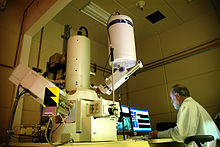


Scientific research is a systematic way of gathering data and harnessing curiosity.[citation needed] This research provides scientific information and theories for the explanation of the nature and the properties of the world. It makes practical applications possible. Scientific research is funded by public authorities, by charitable organizations, and by private groups, including many companies. Scientific research can be subdivided into different classifications according to their academic and application disciplines.[needs copy edit]
Generally, research is understood to follow a certain structural
- Observations and formation of the topic: Consists of the subject area of one's interest and following that subject area to conduct subject-related research. The subject area should not be randomly chosen since it requires reading a vast amount of literature on the topic to determine the gap in the literature the researcher intends to narrow. A keen interest in the chosen subject area is advisable. The research will have to be justified by linking its importance to already existing knowledge about the topic.
- Hypothesis: A testable prediction which designates the relationship between two or more variables.
- Conceptual definition: Description of a concept by relating it to other concepts.
- Operational definition: Details in regards to defining the variables and how they will be measured/assessed in the study.
- Gathering of data: Consists of identifying a population and selecting samples, gathering information from or about these samples by using specific research instruments. The instruments used for data collection must be valid and reliable.
- Analysis of data: Involves breaking down the individual pieces of data to draw conclusions about it.
- Data Interpretation: This can be represented through tables, figures, and pictures, and then described in words.
- Test, revising of hypothesis
- Conclusion, reiteration if necessary
A common misconception is that a hypothesis will be proven (see, rather, null hypothesis). Generally, a hypothesis is used to make predictions that can be tested by observing the outcome of an experiment. If the outcome is inconsistent with the hypothesis, then the hypothesis is rejected (see falsifiability). However, if the outcome is consistent with the hypothesis, the experiment is said to support the hypothesis. This careful language is used because researchers recognize that alternative hypotheses may also be consistent with the observations. In this sense, a hypothesis can never be proven, but rather only supported by surviving rounds of scientific testing and, eventually, becoming widely thought of as true.
A useful hypothesis allows prediction and within the accuracy of observation of the time, the prediction will be verified. As the accuracy of observation improves with time, the hypothesis may no longer provide an accurate prediction. In this case, a new hypothesis will arise to challenge the old, and to the extent that the new hypothesis makes more accurate predictions than the old, the new will supplant it. Researchers can also use a null hypothesis, which states no relationship or difference between the independent or dependent variables.
Research in the humanities
Research in the humanities involves different methods such as for example
Artistic research
Artistic research, also seen as 'practice-based research', can take form when creative works are considered both the research and the object of research itself. It is the debatable body of thought which offers an alternative to purely scientific methods in research in its search for knowledge and truth.
The controversial trend of artistic teaching becoming more academics-oriented is leading to artistic research being accepted as the primary mode of enquiry in art as in the case of other disciplines.
Artistic research has been defined by the School of Dance and Circus (Dans och Cirkushögskolan, DOCH), Stockholm in the following manner – "Artistic research is to investigate and test with the purpose of gaining knowledge within and for our artistic disciplines. It is based on artistic practices, methods, and criticality. Through presented documentation, the insights gained shall be placed in a context."[15] Artistic research aims to enhance knowledge and understanding with presentation of the arts.[16] A simpler understanding by Julian Klein defines artistic research as any kind of research employing the artistic mode of perception.[17] For a survey of the central problematics of today's artistic research, see Giaco Schiesser.[18]
According to artist Hakan Topal, in artistic research, "perhaps more so than other disciplines, intuition is utilized as a method to identify a wide range of new and unexpected productive modalities".[19] Most writers, whether of fiction or non-fiction books, also have to do research to support their creative work. This may be factual, historical, or background research. Background research could include, for example, geographical or procedural research.[20]
The
Patricia Leavy addresses eight arts-based research (ABR) genres: narrative inquiry, fiction-based research, poetry, music, dance, theatre, film, and visual art.[26]
In 2016, the European League of Institutes of the Arts launched The Florence Principles' on the Doctorate in the Arts.[27] The Florence Principles relating to the Salzburg Principles and the Salzburg Recommendations of the European University Association name seven points of attention to specify the Doctorate / PhD in the Arts compared to a scientific doctorate / PhD. The Florence Principles have been endorsed and are supported also by AEC, CILECT, CUMULUS and SAR.
Historical research
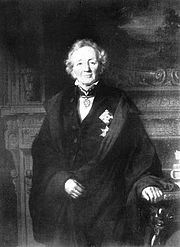
The
- Identification of origin date
- Evidence of localization
- Recognition of authorship
- Analysis of data
- Identification of integrity
- Attribution of credibility
Documentary research
Steps in conducting research
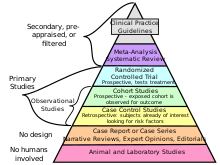
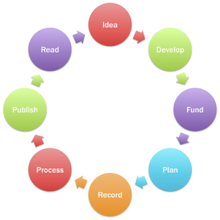
Research is often conducted using the hourglass model structure of research.[29] The hourglass model starts with a broad spectrum for research, focusing in on the required information through the method of the project (like the neck of the hourglass), then expands the research in the form of discussion and results. The major steps in conducting research are:[30]
- Identification of research problem
- Literature review
- Specifying the purpose of research
- Determining specific research questions
- Specification of a conceptual framework, sometimes including a set of hypotheses[31]
- Choice of a methodology (for data collection)
- Data collection
- Verifying data
- Analyzing and interpreting the data
- Reporting and evaluating research
- Communicating the research findings and, possibly, recommendations
The steps generally represent the overall process; however, they should be viewed as an ever-changing iterative process rather than a fixed set of steps.[32] Most research begins with a general statement of the problem, or rather, the purpose for engaging in the study.[33] The literature review identifies flaws or holes in previous research which provides justification for the study. Often, a literature review is conducted in a given subject area before a research question is identified. A gap in the current literature, as identified by a researcher, then engenders a research question. The research question may be parallel to the hypothesis. The hypothesis is the supposition to be tested. The researcher(s) collects data to test the hypothesis. The researcher(s) then analyzes and interprets the data via a variety of statistical methods, engaging in what is known as empirical research. The results of the data analysis in rejecting or failing to reject the null hypothesis are then reported and evaluated. At the end, the researcher may discuss avenues for further research. However, some researchers advocate for the reverse approach: starting with articulating findings and discussion of them, moving "up" to identification of a research problem that emerges in the findings and literature review. The reverse approach is justified by the transactional nature of the research endeavor where research inquiry, research questions, research method, relevant research literature, and so on are not fully known until the findings have fully emerged and been interpreted.
Plato in Meno talks about an inherent difficulty, if not a paradox, of doing research that can be paraphrased in the following way, "If you know what you're searching for, why do you search for it?! [i.e., you have already found it] If you don't know what you're searching for, what are you searching for?!"[35]
Research methods

The goal of the research process is to produce new knowledge or deepen understanding of a topic or issue. This process takes three main forms (although, as previously discussed, the boundaries between them may be obscure):
- Exploratory research, which helps to identify and define a problem or question.
- Constructive research, which tests theories and proposes solutions to a problem or question.
- Empirical research, which tests the feasibility of a solution using empirical evidence.
There are two major types of empirical research design: qualitative research and quantitative research. Researchers choose qualitative or quantitative methods according to the nature of the research topic they want to investigate and the research questions they aim to answer:
Qualitative research refers to much more subjective non- quantitative, use different methods of collecting data, analyzing data, interpreting data for meanings, definitions, characteristics, symbols metaphors of things. Qualitative research further classified into following types: Ethnography: This research mainly focus on culture of group of people which includes share attributes, language, practices, structure, value, norms and material things, evaluate human lifestyle. Ethno: people, Grapho: to write, this disciple may include ethnic groups, ethno genesis, composition, resettlement and social welfare characteristics. Phenomenology: It is very powerful strategy for demonstrating methodology to health professions education as well as best suited for exploring challenging problems in health professions educations.[37] In addition, PMP researcher Mandy Sha argued that a project management approach is necessary to control the scope, schedule, and cost related to qualitative research design, participant recruitment, data collection, reporting, as well as stakeholder engagement.[38][39]
- Quantitative research
- This involves systematic empirical investigation of quantitative properties and phenomena and their relationships, by asking a narrow question and collecting numerical data to analyze it utilizing statistical methods. The quantitative research designs are experimental, correlational, and survey (or descriptive).[40] Statistics derived from quantitative research can be used to establish the existence of associative or causal relationships between variables. Quantitative research is linked with the philosophical and theoretical stance of positivism.
The quantitative data collection methods rely on random sampling and structured data collection instruments that fit diverse experiences into predetermined response categories. These methods produce results that can be summarized, compared, and generalized to larger populations if the data are collected using proper sampling and data collection strategies.[41] Quantitative research is concerned with testing hypotheses derived from theory or being able to estimate the size of a phenomenon of interest.[41]
If the research question is about people, participants may be randomly assigned to different treatments (this is the only way that a quantitative study can be considered a true experiment).[citation needed] If this is not feasible, the researcher may collect data on participant and situational characteristics to statistically control for their influence on the dependent, or outcome, variable. If the intent is to generalize from the research participants to a larger population, the researcher will employ probability sampling to select participants.[42]
In either qualitative or quantitative research, the researcher(s) may collect primary or secondary data.[41] Primary data is data collected specifically for the research, such as through interviews or questionnaires. Secondary data is data that already exists, such as census data, which can be re-used for the research. It is good ethical research practice to use secondary data wherever possible.[43]
Mixed-method research, i.e. research that includes qualitative and quantitative elements, using both primary and secondary data, is becoming more common.[44] This method has benefits that using one method alone cannot offer. For example, a researcher may choose to conduct a qualitative study and follow it up with a quantitative study to gain additional insights.[45]
Big data has brought big impacts on research methods so that now many researchers do not put much effort into data collection; furthermore, methods to analyze easily available huge amounts of data have also been developed. Types of Research Method 1. Observatory Research Method 2. Correlation Research Method [46]
- Non-empirical research
Non-empirical (theoretical) research is an approach that involves the development of theory as opposed to using observation and experimentation. As such, non-empirical research seeks solutions to problems using existing knowledge as its source. This, however, does not mean that new ideas and innovations cannot be found within the pool of existing and established knowledge. Non-empirical research is not an absolute alternative to empirical research because they may be used together to strengthen a research approach. Neither one is less effective than the other since they have their particular purpose in science. Typically empirical research produces observations that need to be explained; then theoretical research tries to explain them, and in so doing generates empirically testable hypotheses; these hypotheses are then tested empirically, giving more observations that may need further explanation; and so on. See Scientific method.
A simple example of a non-empirical task is the prototyping of a new drug using a differentiated application of existing knowledge; another is the development of a business process in the form of a flow chart and texts where all the ingredients are from established knowledge. Much of cosmological research is theoretical in nature. Mathematics research does not rely on externally available data; rather, it seeks to prove theorems about mathematical objects.
Research ethics
Research ethics is a discipline within the study of applied ethics. Its scope ranges from general scientific integrity and misconduct to the treatment of human and animal subjects. The societal responsibilities science and reseach has are not traditionally included and less well defined.
The discipline is most developed in medical research. Beyond the issues of falsification, fabrication and plagiarism that arise in every scientific field, research design in human subject research and animal testing are the areas that raise ethical questions themselves most often.
The
Today,
, govern and oversee the responsible conduct of research. Research in other fields such as may generate ethical concerns.Problems in research
Meta-research
Meta-research is the study of research through the use of research methods. Also known as "research on research", it aims to reduce waste and increase the quality of research in all fields. Meta-research concerns itself with the detection of bias, methodological flaws, and other errors and inefficiencies. Among the finding of meta-research is a low rates of reproducibility across a large number of fields. This widespread difficulty in reproducing research has been termed the "replication crisis."[47]
Methods of research
In many disciplines, Western methods of conducting research are predominant.
Bias
Research is often biased in the languages that are preferred (
For comparative politics, Western countries are over-represented in single-country studies, with heavy emphasis on Western Europe, Canada, Australia, and New Zealand. Since 2000, Latin American countries have become more popular in single-country studies. In contrast, countries in Oceania and the Caribbean are the focus of very few studies. Patterns of geographic bias also show a relationship with linguicism: countries whose official languages are French or Arabic are far less likely to be the focus of single-country studies than countries with different official languages. Within Africa, English-speaking countries are more represented than other countries.[53]
Generalizability
Generalization is the process of more broadly applying the valid results of one study.[54] Studies with a narrow scope can result in a lack of generalizability, meaning that the results may not be applicable to other populations or regions. In comparative politics, this can result from using a single-country study, rather than a study design that uses data from multiple countries. Despite the issue of generalizability, single-country studies have risen in prevalence since the late 2000s.[53]
Publication peer review
This article needs to be updated. The reason given is: This subsection's claims are potentially outdated in the "digital age" given that near-total penetration of Web access among scholars worldwide enables any scholar[s] to submit papers to any journal anywhere. (May 2017) |
Peer review is a form of self-regulation by qualified members of a profession within the relevant field. Peer review methods are employed to maintain standards of quality, improve performance, and provide credibility. In academia, scholarly peer review is often used to determine an academic paper's suitability for publication. Usually, the peer review process involves experts in the same field who are consulted by editors to give a review of the scholarly works produced by a colleague of theirs from an unbiased and impartial point of view, and this is usually done free of charge. The tradition of peer reviews being done for free has however brought many pitfalls which are also indicative of why most peer reviewers decline many invitations to review.[55] It was observed that publications from periphery countries rarely rise to the same elite status as those of North America and Europe, because limitations on the availability of resources including high-quality paper and sophisticated image-rendering software and printing tools render these publications less able to satisfy standards currently carrying formal or informal authority in the publishing industry.[52] These limitations in turn result in the under-representation of scholars from periphery nations among the set of publications holding prestige status relative to the quantity and quality of those scholars' research efforts, and this under-representation in turn results in disproportionately reduced acceptance of the results of their efforts as contributions to the body of knowledge available worldwide.
Influence of the open-access movement
The open access movement assumes that all information generally deemed useful should be free and belongs to a "public domain", that of "humanity".[56] This idea gained prevalence as a result of Western colonial history and ignores alternative conceptions of knowledge circulation. For instance, most indigenous communities consider that access to certain information proper to the group should be determined by relationships.[56]
There is alleged to be a double standard in the Western knowledge system. On the one hand, "digital right management" used to restrict access to personal information on social networking platforms is celebrated as a protection of privacy, while simultaneously when similar functions are used by cultural groups (i.e. indigenous communities) this is denounced as "access control" and reprehended as censorship.[56]
Future perspectives
Even though Western dominance seems to be prominent in research, some scholars, such as Simon Marginson, argue for "the need [for] a plural university world".[57] Marginson argues that the East Asian Confucian model could take over the Western model.
This could be due to changes in funding for research both in the East and the West. Focused on emphasizing educational achievement, East Asian cultures, mainly in China and South Korea, have encouraged the increase of funding for research expansion.[57] In contrast, in the Western academic world, notably in the United Kingdom as well as in some state governments in the United States, funding cuts for university research have occurred, which some [who?] say may lead to the future decline of Western dominance in research.
Neo-colonial approaches
Neo-colonial research or
Frequently, during this kind of research, the local colleagues might be used to provide logistics support as
Professionalisation
The examples and perspective in this section may not represent a worldwide view of the subject. (January 2014) |
In several national and private academic systems, the
In Russia
In present-day Russia, and some other countries of the former
The following ranks are known:
- Junior Researcher (Junior Research Associate)
- Researcher (Research Associate)
- Senior Researcher (Senior Research Associate)
- Leading Researcher (Leading Research Associate)[69]
- Chief Researcher (Chief Research Associate)
Publishing
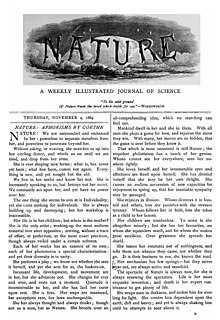
Academic publishing is a system that is necessary for academic scholars to peer review the work and make it available for a wider audience. The system varies widely by field and is also always changing, if often slowly. Most academic work is published in journal article or book form. There is also a large body of research that exists in either a thesis or dissertation form. These forms of research can be found in databases explicitly for theses and dissertations. In publishing, STM publishing is an abbreviation for academic publications in science, technology, and medicine. Most established
Research statistics and funding
This section needs expansion with: funding for research in the humanities and other areas.
Presently, only scientific research is addressed. You can help by adding to it. (April 2019) |
Most funding for scientific research comes from three major sources:
The total number of researchers (full-time equivalents) per million inhabitants for individual countries is shown in the following table.
Research expenditure by type of research as a share of GDP for individual countries is shown in the following table.
| Country | Research expenditure as a share of GDP by type of research (%), 2018[75] | |||
|---|---|---|---|---|
| Basic | Applied | Development | ||
| 0.01 | 0.27 | 0.02 | ||
| 0.14 | 0.27 | 0.12 | ||
| 0.54 | 1.00 | 1.46 | ||
| 0.30 | 1.24 | 1.16 | ||
| 0.08 | 0.47 | 0.20 | ||
| 0.10 | 0.14 | 0.08 | ||
| 0.12 | 0.24 | 1.82 | ||
| 0.10 | 0.07 | 0.02 | ||
| 0.33 | 0.28 | 0.25 | ||
| 0.08 | 0.30 | 0.18 | ||
| 0.50 | 0.77 | 0.66 | ||
| 0.56 | 0.95 | 1.54 | ||
| 0.35 | 0.28 | 0.66 | ||
| 0.50 | 0.92 | 0.78 | ||
| 0.35 | 0.37 | 0.41 | ||
| 0.26 | 0.30 | 0.78 | ||
| 0.43 | 0.95 | 0.66 | ||
| 0.10 | 0.15 | 0.13 | ||
| 0.22 | 0.42 | 0.55 | ||
| 0.31 | 0.58 | 0.49 | ||
| 0.52 | 0.51 | 3.93 | ||
| 0.41 | 0.62 | 2.10 | ||
| 0.02 | 0.07 | 0.03 | ||
| 0.00 | 0.06 | 0.00 | ||
| 0.16 | 0.22 | 0.13 | ||
| 0.24 | 0.38 | 0.28 | ||
| 0.48 | 0.49 | 0.33 | ||
| 0.42 | 0.81 | 0.21 | ||
| 0.30 | 0.19 | 0.09 | ||
| 0.03 | 0.12 | 0.02 | ||
| 0.10 | 0.09 | 0.12 | ||
| 0.10 | 0.21 | 0.04 | ||
| 0.52 | 0.87 | 0.60 | ||
| 0.34 | 0.55 | 0.48 | ||
| 0.09 | 0.23 | 0.05 | ||
| 0.38 | 0.79 | 0.93 | ||
| 0.30 | 0.18 | 0.55 | ||
| 0.29 | 0.51 | 0.53 | ||
| 0.10 | 0.31 | 0.09 | ||
| 0.15 | 0.21 | 0.65 | ||
| 0.29 | 0.34 | 0.29 | ||
| 0.46 | 0.61 | 0.87 | ||
| 0.33 | 0.20 | 0.30 | ||
| 0.33 | 0.82 | 0.71 | ||
| 0.22 | 0.44 | 0.17 | ||
| 0.68 | 1.06 | 3.07 | ||
| 0.26 | 0.50 | 0.45 | ||
| 1.41 | 1.09 | 0.88 | ||
| 0.10 | 0.27 | 0.64 | ||
| 0.11 | 0.10 | 0.27 | ||
| 0.30 | 0.74 | 0.64 | ||
| 0.47 | 0.56 | 1.80 | ||
| 0.07 | 0.30 | 0.04 | ||
See also
- Advertising research
- European Charter for Researchers
- Funding bias
- Internet research
- Laboratory
- List of countries by research and development spending
- List of words ending in ology
- Market research
- Marketing research
- Open research
- Operations research
- Participatory action research
- Psychological research methods
- Research integrity
- Research-intensive cluster
- Research organization
- Research proposal
- Research university
- Scholarly research
- Secondary research
- Social research
- Society for Artistic Research
- Timeline of the history of the scientific method
- Undergraduate research
References
- ISBN 978-9264238800. Archivedfrom the original on 5 June 2020. Retrieved 4 April 2020.
- .
- ^ "The Origins of Science Archived 3 March 2003 at the Wayback Machine". Scientific American Frontiers.
- ^ a b c "Research". Merriam-Webster. Archived from the original on 18 October 2018. Retrieved 20 May 2018.
- ^ Grover, Vijey (2015). "RESEARCH APPROACH: AN OVERVIEW". Golden Research Thoughts. 4.
- ^ Creswell, J.W. (2008). Educational Research: Planning, conducting, and evaluating quantitative and qualitative research (3rd ed.). Upper Saddle River: Pearson.[ISBN missing][page needed]
- ^ "What is Original Research? Original research is considered a primary source". Thomas G. Carpenter Library, University of North Florida. Archived from the original on 9 July 2011. Retrieved 9 August 2014.
- ISBN 978-0071511223– via Google Books.
- ^ Singh, Michael; Li, Bingyi (6 October 2009). "Early career researcher originality: Engaging Richard Florida's international competition for creative workers" (PDF). Centre for Educational Research, University of Western Sydney. p. 2. Archived (PDF) from the original on 10 April 2011. Retrieved 12 January 2012.
- PMID 12038930.
- ISBN 978-0071472883– via Google Books.
- .
- (PDF) from the original on 5 October 2011. Retrieved 14 August 2011.
- JSTOR 1175121.
- ^ Unattributed. "Artistic research at DOCH". Dans och Cirkushögskolan (website). Archived from the original on 5 November 2011. Retrieved 14 August 2011.
- ^ Schwab, M. (2009). "Draft Proposal". Journal for Artistic Research. Bern University of the Arts.
- ^ Julian Klein (2010). "What is artistic research?". Archived from the original on 13 May 2021. Retrieved 15 June 2021.
- ^ Schiesser, G. (2015). What is at stake – Qu'est ce que l'enjeu? Paradoxes – Problematics – Perspectives in Artistic Research Today, in: Arts, Research, Innovation and Society. Eds. Gerald Bast, Elias G. Carayannis [= ARIS, Vol. 1]. Wien/New York: Springer. pp. 197–210.
- ^ Topal, H. (2014). "Whose Terms? A Glossary for Social Practice: Research". newmuseum.org. Archived from the original on 9 September 2014.
- ^ Hoffman, A. (2003). Research for Writers, pp. 4–5. London: A&C Black Publishers Limited.
- ^ "Swiss Science and Technology Research Council (2011), Research Funding in the Arts" (PDF).[permanent dead link]
- ^ Henk Borgdorff (2012), The Conflict of the Faculties. Perspectives on Artistic Research and Academia (Chapter 11: The Case of the Journal for Artistic Research), Leiden: Leiden University Press.
- ^ Schwab, Michael, and Borgdorff, Henk, eds. (2014), The Exposition of Artistic Research: Publishing Art in Academia, Leiden: Leiden University Press.
- ^ Wilson, Nick and van Ruiten, Schelte / ELIA, eds. (2013), SHARE Handbook for Artistic Research Education, Amsterdam: Valand Academy, p. 249.
- ^ Hughes, Rolf: "Leap into Another Kind: International Developments in Artistic Research", in Swedish Research Council, ed. (2013), Artistic Research Then and Now: 2004–2013, Yearbook of AR&D 2013, Stockholm: Swedish Research Council.
- ISBN 978-1462519446.
- ^ Rahmat, Omarkhil. "Florence principles, 2016" (PDF). Archived from the original (PDF) on 21 December 2016. Retrieved 23 December 2016.
- ISBN 978-0-8371-7132-6.
- ^ Trochim, W.M.K, (2006). Research Methods Knowledge Base.
- ISBN 0-13-613550-1(pages 8–9)
- ]
- ISBN 0-521-81689-0(page 3)
- ISBN 978-0-470-39335-2
- ^ "QUESTIONS ABOUT FREEDOM, DEMOCIDE, AND WAR". www.hawaii.edu. Archived from the original on 4 January 2012. Retrieved 25 November 2011.
- ^ Plato, & Bluck, R. S. (1962). Meno. Cambridge, UK: University Press.
- ^ Sullivan P (13 April 2005). "Maurice R. Hilleman dies; created vaccines". The Washington Post. Archived from the original on 20 October 2012. Retrieved 10 September 2017.
- ISBN 978-81-948755-8-1.
- from the original on 25 November 2023. Retrieved 3 December 2023.
- .
- ^ Creswell, J.W. (2008). Educational Research: Planning, Conducting, and Evaluating Quantitative and Qualitative Research. Upper Saddle River, NJ: Pearson Education, Inc.
- ^ OCLC 1202451096.
- ^ "Data Collection Methods". uwec.edu. Archived from the original on 20 October 2011. Retrieved 26 October 2011.
- ^ Kara H. (2012). Research and Evaluation for Busy Practitioners: A Time-Saving Guide, p. 102. Bristol: The Policy Press.
- ^ Kara H (2012). Research and Evaluation for Busy Practitioners: A Time-Saving Guide, p. 114. Bristol: The Policy Press.
- ISBN 978-1-4522-2609-5. Archivedfrom the original on 16 November 2023. Retrieved 11 December 2018.
- ISBN 978-1118900772.
- PMID 26431313.
- ISSN 0002-8762.
- ISBN 978-1848139503. Archivedfrom the original on 25 October 2018. Retrieved 24 October 2018.
- .
- JSTOR 3588146.
- ^ S2CID 145250687.
- ^ .
- PMID 22665145.
- ^ "Peer Review of Scholarly Journal". www.PeerViewer.com. June 2017. Archived from the original on 30 July 2017. Retrieved 29 July 2017.
- ^ a b c Christen, Kimberly (2012). "Does Information Really Want to be Free? Indigenous Knowledge Systems and the Question of Openness". International Journal of Communication. 6. Archived from the original on 15 July 2017. Retrieved 7 June 2017.
- ^ a b "Sun sets on Western dominance as East Asian Confucian model takes lead". 24 February 2011. Archived from the original on 20 September 2016. Retrieved 29 August 2016.
- ^ ISSN 0016-7061.
- ^ S2CID 18463459.
- ^ "Q&A: Parachute Science in Coral Reef Research". The Scientist Magazine®. Retrieved 24 March 2021.
- ^ a b c "The Problem With 'Parachute Science'". Science Friday. Retrieved 24 March 2021.
- ^ "Scientists Say It's Time To End 'Parachute Research'". NPR.org. Retrieved 24 March 2021.
- S2CID 21725769.
- S2CID 51630341.
- ^ "Helicopter Research". TheFreeDictionary.com. Retrieved 24 March 2021.
- ^ a b Vos, Asha de. "The Problem of 'Colonial Science'". Scientific American. Retrieved 24 March 2021.
- ^ "The Traces of Colonialism in Science". Observatory of Educational Innovation. Retrieved 24 March 2021.
- PMID 33621503.
- ^ "Ведущий научный сотрудник: должностные обязанности". www.aup.ru. Archived from the original on 1 April 2010. Retrieved 22 January 2014.
- ^ Heiner Evanschitzky, Carsten Baumgarth, Raymond Hubbard and J. Scott Armstrong (2006). "Replication Research in Marketing Revisited: A Note on a Disturbing Trend" (PDF). Archived from the original (PDF) on 20 June 2010. Retrieved 10 January 2012.
{{cite web}}: CS1 maint: multiple names: authors list (link) - S2CID 25687243. Archived from the original(PDF) on 21 June 2010. Retrieved 11 January 2012.
- S2CID 154398140. Archived from the original(PDF) on 20 June 2010. Retrieved 11 January 2012.
- ^ "Home | RePORT". report.nih.gov. Archived from the original on 21 May 2021. Retrieved 22 May 2021.
- ^ Research input and output worldwide, various years since 2014, Statistical Annex, by country, Table C2: Total researchers and researchers per million inhabitants, 2015 and 2018
- ^ Research input and output worldwide, various years since 2014, Statistical Annex, by country, Table B1: Research expenditure as a share of GDP and in purchasing power parity dollars (PPP$), 2015–2018, year 2018
Further reading
- Groh, Arnold (2018). Research Methods in Indigenous Contexts. New York: Springer. ISBN 978-3-319-72774-5.
- Cohen, N.; Arieli, T. (2011). "Field research in conflict environments: Methodological challenges and snowball sampling". Journal of Peace Research. 48 (4): 423–436. S2CID 145328311.
- Soeters, Joseph; Shields, Patricia and Rietjens, Sebastiaan. 2014. Handbook of Research Methods in Military Studies New York: Routledge.
- Talja, Sanna and Pamela J. Mckenzie (2007). Editor's Introduction: Special Issue on Discursive Approaches to Information Seeking in Context, The University of Chicago Press.
